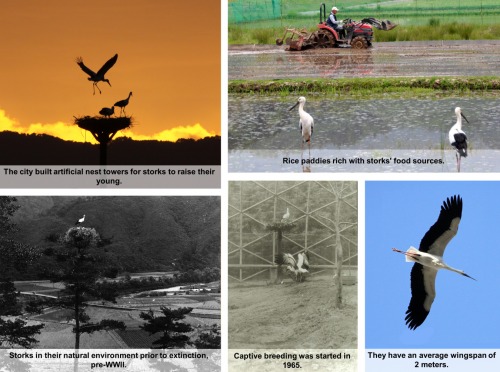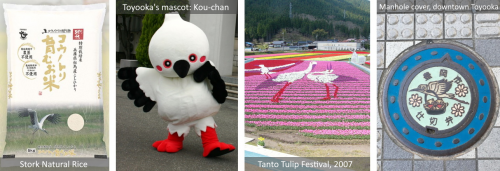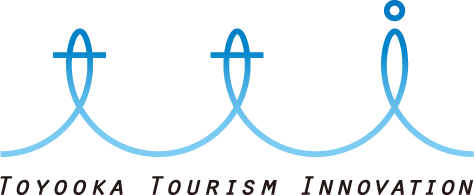【Press Release】Toyooka City’s Environmental Miracle
Unlike the bustling cities of Tokyo and Osaka, in Kinosaki Onsen and its surrounding areas you can come across various wildlife. From the beach to the mountains to the wetlands, visitors can spot various birds, fish, and other creatures coexisting with the locals. One of these is a beloved symbol of Toyooka City, the Oriental White Stork. These birds tell the story of Toyooka’s promise to reintroduce them back into the wild.

Commonly known as kounotori in Japanese, the Oriental White Stork once lived in the wild in Japan, until, in 1971, the last stork died in Toyooka City. Part of the reason they disappeared was due to the pesticides that were heavily used in the farmlands of the nation. Toyooka City felt responsible for this tragedy, and thus made a promise to help reintroduce the Oriental White Stork into the wild.
Soon, a breeding and research facility was created to begin breeding and raising them in captivity. However, chicks could not hatch for many years due to the adult storks’ chemically damaged bodies. Although discouraged, Toyooka City never gave up. Thanks to a donation of six young storks from Russia, the city was able to continue their efforts. In 1989, a miracle occurred when the Oriental White Storks produced a healthy chick, achieving successful breeding for the first time. Chicks have successfully hatched every year since.
After half a century of various efforts from Toyooka City, the first storks were successfully reintroduced into the wild on September 24th, 2005. As of June 25th of this year, the number of Oriental White Storks in the wild has reached 200, an amazing milestone for the species and the city! Such a feat of environmental restoration serves as an inspiration for the world.

When visiting Toyooka City, you can spot many Oriental White Storks, especially at the Hyogo Park of the Oriental White Stork, a conservation site which includes a museum. The park has videos on their Facebook page of the chicks that hatch each spring. Farmers in the area use an environmentally-friendly method for cultivating rice that does not rely on agricultural chemicals, which supports a clean ecology for the storks and other wildlife. A portion of the profits from sales of this ethically-sourced rice, known as Stork Natural Rice, goes towards the protection of the storks.

Additionally, visitors to the area can join a tour to learn about how the city is committed to strengthening the ecology of the storks and fulfilling their promise of returning the Oriental White Storks to Japan’s skies. Visit environmental agriculture sites that aim to create a rich natural environment where storks can live. Guests will also get to try organic rice and vegetables that positively impact the ecosystem, as well as explore the area’s lush wetlands.

